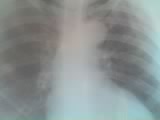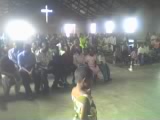dimanche 30 novembre 2014
Emory University Colposcopy clinic visit for Dr Mateus
After the CDC Meeting on Wednesday March 26, 2014, a mentorship program was built between Dr Lisa Flowers, professor at Emory University School of Medicine (mentor) and Dr Mateus, doctor at Hope Medical Center and Agir Ensemble (mentee) to allow the Emory University serving as US Collaborator for research grants programs issued the NIH. A visit of 2 days (Thursday March 27 and Friday March 28, 2014) was held to allow Dr Mateus increasing his skills in Colposcopy and to be more familiar with the Emory University Colposcopy Clinic environment.
On Wednesday March 26, after noon, a contact visit was organized for a brief meeting between Dr Lisa Flowers (Emory), Dr Makeda Williams (NCI) and Dr Mateus Sahani (Hope Medical Center/Agir Ensemble).
On Thursday March 27, 2014 Dr Mateus assisted to many cases of Colposcopy at the Emory Grady Campus and visited the laboratory department for biopsy analysis and HPV testing machine.
On Friday March 28, 2014 Dr Mateus assisted and learnt how to use many kinds of colposcopes with laptop for monitoring and taking images.
For the visit, Dr Mateus was accompanied by his mentor, Dr Lisa Flowers from the Emory University, School of Medicine.
We sincerely thank all people who were involved for the success of our visit, especially Dr Ted Trimble (NCI), Dr Makeda Williams (NCI), Dr Lisa Flowers (Emory University), etc.
Cervical cancer situation in D.R.Congo: Dr Sahani’s presentation at CDC, Atlanta/GA-USA
After the SGO Annual Meeting in Tampa/FL, another meeting was held in Atlanta/Georgia-USA to allow Dr Mateus meeting with some people at CDC headquarter and can help building partnership to sustain the cervical cancer prevention program in Democratic Republic of Congo.
Dr Mateus met with many people on Wednesday, March 26, 2014 at different time and different places in the headquarter’s office.
From 11:00 to 12:00, Dr Mateus did a presentation on cervical cancer situation in Democratic Republic of Congo, the leadership role that Agir Ensemble and Hope Medical Center are undertaking to initiate the program in the country, the way to change things, the way help DRC and specified what are the main challenges and how to overcome them.
For the visit, Dr Mateus was accompanied by his mentor, Dr Makeda Williams from the NCI, Center for Global Health and the visit was directed by Jeff Glen from CDC.
We sincerely thank all people who were involved for the success of our visit, especially Dr Ted Trimble (NCI), Dr Makeda Williams (NCI), Jeff Glen (CDC), Jackie Miller (CDC), etc.
The agenda of Dr Mateus’s visit at CDC is detailed below:
Dr. Mateus Sahani visit to CDC
Wednesday, March 26th, 2014
Agenda
POC: Jeff Glen, 801-550-2142
8:15 – 9:00 am Travel and entry to CDC Chamblee Campus
4770 Buford Highway NE, Atlanta, GA 30341
9:00 – 10:00 am Meeting with DCPC National Breast and Cervical Cancer Early Detection Program
• Jackie Miller, Medical Officer
Chamblee Campus, Bldg 107, Room 4D
10:00 – 11:00 am
Meeting with DCPC HPV Workgroup
Chamblee Campus, Bldg 107 , Room 1A
11:00 – 12:00 pm Presentation
Chamblee Campus, Bldg 107, Room 1A
12:00 – 1:00 pm Lunch
Travel and entry to CDC Roybal Campus
1600 Clifton Rd. NE, Atlanta, GA 30333
1:00 – 1:30 pm Meeting with Global Immunization Division
• Ben Dahl, Epidemiologist
Roybal Campus, Bldg 19, Room 246
1:30 – 3:00 pm
Meeting with CDC HPV laboratory
• Beth Unger, Director
Roybal Campus, Bldg 23, 4th Floor
3:00 – 4:00 pm Tour of CDC Museum
Roybal Campus
After the different meetings, a tour was organized to visit the CDC Museum with Jeff Glen and Makeda Williams.
Difficulty of Single Visit Approach for Colposcopy in Goma/DRC
The SGO (Society of Gynecologic Oncology) 2014 Annual Meeting was held in Tampa/Florida-USA from March 21-26, 2014 and Agir Ensemble/DRC was represented by Dr Mateus K. Sahani with an oral presentation related to colposcopy, a young service in DRC initiated at Hope Medical Center in Goma city. The attendance to this valuable meeting was supported by the U.S. NCI (National Cancer Institute), Center for Global Health and the SGO (Society of Gynecologic Oncology) and we would like to sincerely thank these organizations for their support which allowed us attending the meeting and present our work.
It was found that women who are totally healthy don’t come to colposcopy clinic because they are not aware of the program and they are not committed to pay for a service while not having any clinical sign that motivate them to consult the doctor/colposcopist.
The abstract presented is below:
Background and justification:
Cervical cancer is a major public health issue worldwide and particularly in Democratic Republic of Congo it is the first cause of death by cancer. Our colposcopy unit is too young (only 6 months of existence) and is the only one colposcopy center in the country. No woman could get access to cervical cancer screening before in whole the country and almost all women and other people don’t know much about cervical cancer screening. This study has objectives to inform more health professionals in our community and more donors and funders worldwide of the reasons of challenges for SVA for colposcopy in Goma.
Method:
We are performing cervical cancer screening at Hope Medical Center (HMC) and we have analyzed the feasibility of single visit approach for colposcopy during the screening. This is a descriptive and analytic study with data found from the screening procedure reports at HMC. Statistical test like comparison of percentages has been applied to analyze our data. From these 6 months we have screened 115 women, n=115. We have used EPI-INFO 6 software to analyze our data.
Results:
According to the age:
Age: 20-30 31-40 41-50 >50 Total
Number: 40 52 18 5 115
Percentage: 34.78% 45.22% 15.65% 4.35% 100%
When we compare these different percentages, there a significant difference and this means that there more women with precancerous lesions in the age group of 31-40 years old.
Among 115 women screened, we have found 31 (26.95%) women with precancer and 84 (73.04%) women with negative result. WHO has an estimate of 20.3%as reference cervical cancer prevalence in Democratic Republic of Congo. When we compare these 2 proportions, we find that the difference is not statistically significant. This to say that cervical cancer situation in this local community is the same as what was expected by WHO (X2 = 3.15 and p = 0.075972). Among the 31 women with positive results, 9 (29.03%) have CIN I, 17 (54.84%) have CIN II and 5 (16.13%) have CIN III. Those with CIN II and CIN III require treatment by excision (22 women).
Among the 22 women who require treatment, all of them didn’t accept to be treated at the first visit for many reasons:
1. To talk first with the husband before being treated: 7 (31.82%)
2. To look for money for the treatment: 13 (59.09%)
3. Need to think about it before accepting to be treated: 2 (9.09%)
When we compare these 3 proportions, we find that the difference is statistically significant and this means that more women are not ready to be treated at the first visit because of missing money for the treatment (X2 = 12.41; p = 0.002020).
Conclusions:
Almost all women are not ready to be treated at the first visit because of missing money (1st cause), involve the husband to the decision (2nd cause) and need to be convinced to accept treatment (3rd cause). It is very important that colposcopy program in Low and Middle Income Countries get financial supports from committed donors and funders to overcome the big challenge.
Inscription à :
Commentaires (Atom)





















































































































